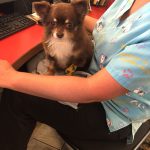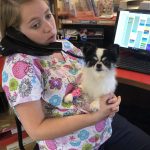Hi. Can you tell me how you treated this? My Pumpkin has a very similar problem, he has a set of asymmetrical ulcers on his upper lip, but they aren’t going away and none of his vets (regular and oncologist) have a clue what they are from or how to resolve them. He was doing well with chemotherapy for Lymphoma but the ulcers have made him backtrack.
My bunny has been acting very strangely lately. We put her harness and leash on her and took her to the park. We spent a lot of time with her. Then, people were watching her (family) and I wasn’t there so I don’t know what happened. When we brought her back, she looked really scared. My family said that when I left, she just sat there staring at everyone. At home, she hasn’t been eating as much as she used to. She would practically snatch the food from my hand. Now, she sniffed, took a bite and walked away. We tried again with her favorite food, but she didn’t eat it. She’s been laying and sleeping way more than usual (practically all the time). During training sessions with me, she used to care and loved it. Now, she just sat there staring me for a while. She’s also been super scared. Every time I walked in the room, she’d jump up to me, now she runs away at the slightest noise. She’s also been pretty aggressive. She was laying and I reached over to pet her. She let me pet her for two seconds before she reared back on her hind legs and tried to scratch me. Hard. She’s also pretty stressed (her breathing is really fast). What is going on with her?
Comments
Comments
-
Nicole Jacobs
Hi pawbly-
If a dog had pneumonia as a puppy, are there residual effects when they are older? I’m curious because one of our dogs, Riva, apparently had pneumonia when they first got her to the rescue. She is 2 now and seems to tire easily. Loves to play and run, but not for too long. Curious if there is a correlation or if she really is just a diva?
Comments
My cat has squamous cell carcinoma under and behind her tongue. She’s on a feeding tube, and can’t use her tongue for lapping milk or grooming. I’ve been to the cancer vet, and I know she only has 4-6 months. (I’m trying to accept it, but it’s so hard). She sometimes ‘works’ her mouth, opening & closing it, moving her tongue as best she can – I think she knows things don’t feel right and she’s trying to rearrange them. Would it make her more comfortable to have some of the tumor & part of her tongue removed? Or would that just make distress her? Would it just re-grow anyway?
Comments
Comments
I have 2 Pit mixes that itch and chew their paws like crazy. Penny was on Apoquel and can no longer take it because she developed a non cancerous growth on her leg. Sampson was also on it but the only difference it made was his paws weren’t red but still chewed just as much. I was reading and found that his may have something to do with yeast since he has that musty, Frito Corn Chips smell. Penny does not smell. My current Vet put him on a prescription diet (Royal Canin moderate calorie potato and white fish). He has been on it awhile now with no other foods or treats. I also switched Penny more recently. It has not helped them at all. I read that carbohydrates feed yeast but I can not find any foods that don’t have some type of starch. I also clean their paws often with a mix of iodine, apple cider vinegar and water. Nothing helps and I feel horrible for how uncomfortable they must be. I am currently giving them Zyrtec also. I was thinking of having them tested at a veterinarian dermatologist but wanted that as a last resort. Does anyone have any thoughts on this? I just want to give my pups some relief!
Comments
I have an 8 week old Beagle/Labrador mix puppy (Sonny). He is currently on ID because he had diarrhea when I brought him home last weekend. He is “solid” and ready for regular puppy food to be introduced, and I’m at a loss on what to choose. So confused about grain-free debate and ensuring no by products. Please can you give some guidance? Favorites?
Comments
6-month old Golden Retriever/Labrador mix bites me most of the time. She’s usually nice when it’s playtime or feeding time (if she’s overstimulated accidents may or may not happen). But in downtimes she just comes at me. I could be sitting quietly not bothering her and she could be lying down 1 second and the next she’s suddenly biting my arm. It doesn’t often happen to other family members. Is it because she wasn’t taught bite inhibition properly because family members don’t want to leave the room or do it nicely? Is it because they react aggressively when she bites them (i.e. they used to pinch her and step on her paw. now it’s mostly just pinning her down to the floor)?
I’m honestly tired. They think they’re doing it right, but I don’t think it’s working. But since she’s not biting them as much they think of it as working.
I’m literally the only one playing and exercising her and I think that factors in a lot. They just leave her and aside from feeding her in the morning, they really don’t do anything else.
I got a response from another site a few months back and they said I had a people problem, not a puppy problem. Is there anything I can do though? Is it something that’s wrong with me?? I don’t know anymore please help :(((((((((((
Comments
-
Natisha Mullis-Brooks You do have a “people problem”, but that “people problem” has now caused a dog problem. It sounds like the pup is bored and wanting to play, but hasn’t been taught the social niceties of the “human world”. Retrievers are very mouthy in general because that’s what they’re bred for; picking up and carrying things. But there are actually several things you can do to help.
First things first: If she comes at you and bites down on your arm, yell out, “Ow!”, in a loud and high pitched voice. As hard as it might be to do, try not to pull your arm back as this may trigger the tugging instinct. Even at six months old, she can be taught bite inhibition. It’s not too late!! Yelling out in a high pitched, loud voice may startle her into letting go. After all, her goal is not to hurt you, but to play and get some attention. Think of puppies when they play. When one yells in pain, the other usually lets go. That’s our goal here. If she does let go, offer her a toy that the two of you can interact with: a rope for tug, a squeaker for catching, a ball for chasing. Make sure, when you are with her, you have a toy that she likes with you at all times. Because once she lets go, you want to say, “Good girl!” and give her the toy immediately and then a bit of affection for doing the right thing. Most retrievers have high drives and love a game of fetch.
If the yelling doesn’t work, you can yell “Aaaanntt” and push your arm firmly into her mouth. This losens her grib by widening her jaws and most dogs don’t like how it feels. As soon as she releases you, say “Good girl” and offer the toy and your time.
If neither of the above works, you may have to try a bit of nose pressure. When she bites down yell “Ow!” and then place your hand (thumb on one side and index finger on the other) over her nose so that the meaty part between your thumb and finger are applying pressure to the top of her nose. You want to place it about a quarter of the way down her nose. Then squeeze your index finger and thumb together as if you’re trying to make them touch through her nose. You’ll have to supply a decent amount of pressure for this to work, but you don’t r ally want to harm her. The top of a dog’s nose is VERY sensitive and a. Other dog will bite a pup here with some force, when the pup has gotten out of hand. You want to mimick a mother’s technique, sans the teeth. Once she releases you,give her the toy and affection. She may yell when you do this, but I promise you are only causing a bit of discomfort and no large amount of pain.
Lastly, if all else fails you’ll have to become a bit more aggressive in your tactics. -sigh- Ehen she bites you, place your thumb behind her upper canine by the same means as applying pressure to the top of the nose, but apply no pressure. Instead, run your thumb down to her upper lip and push it into her mouth a bit. This will cause her to bite down on her own lip (we all nonhow horrible this feels!) and in most cases, she’ll let go of you almost immediately. Give you, “Good girl” and affection immediately. And bonus, she’ll get to experience her own bite strength, which promotes bite inhibition.
I wish you two a lot of luck. If you have any questions about technique, I’d be happy to send you videos. I’m a Canine Behaviorist and have worked with dogs for over 30 years. Just email me at: tishtish1975@yahoo.com


















I would first and foremost make an appointment with the vet to make sure she is healthy. It may be the stress of the situation (you not being there for a bit) and will take time to get things back to the way they were. I would also ask my family who were watching her if anything happened while you were away. Hope everything is ok.